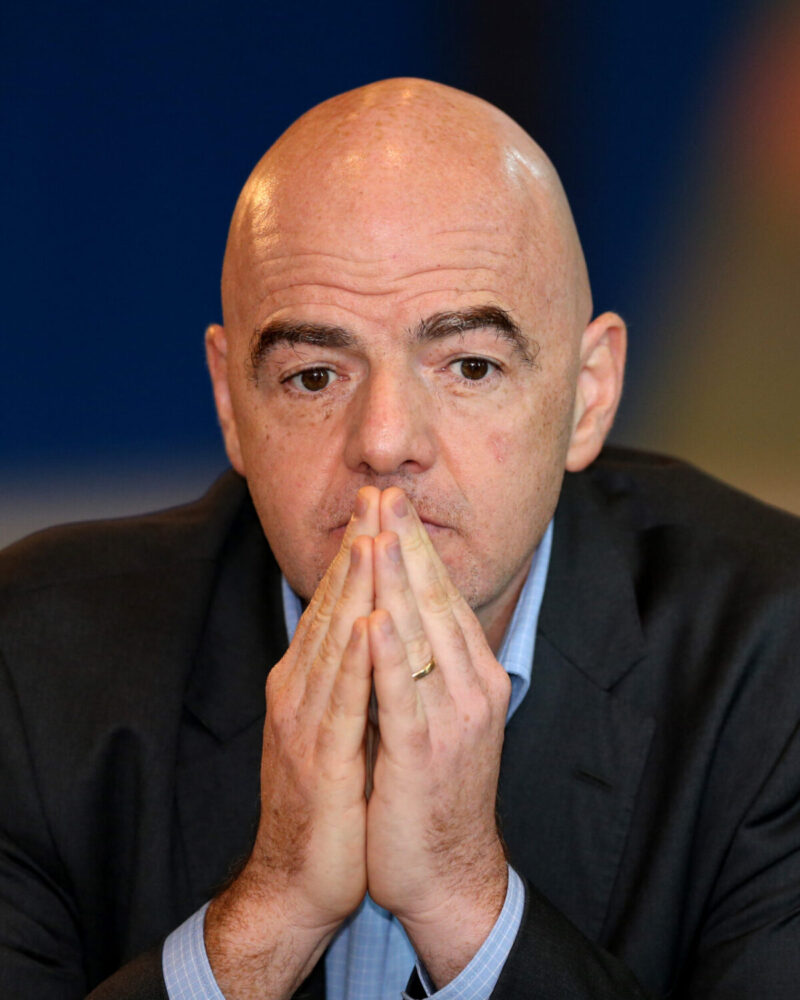FIFA’s push for a biennial World Cup continues to move forward despite pushback from fans, clubs, and players alike. The outrage at the idea is more or less warranted, but if we look at the true motivations of FIFA and the plan’s most vocal opposer, UEFA, the issue becomes a bit more nuanced.
Earlier this week, reports of FIFA continuing to push for a biennial World Cup created a tempest in the football world. Fans haven’t been so outraged since …*checks notes*… earlier this year, when the European Super League announced its short-lived formation in April.
Like with the ESL news, many were critical of the proposal to revamp the World Cup cycle, claiming that it put money before the game. And while the decriers of the new proposed format aren’t wrong, the issue — like most — isn’t quite so black and white.
FIFA’s Proposal and Fatal Mistake
For months now, FIFA has been seriously exploring the possibility of putting on a World Cup every two years. It started in May, when the Saudi Arabian football federation submitted a proposal to the governing body to look into the possibility of biennial World Cups for both men and women. FIFA listened to the proposal, and tasked former Arsenal boss and current FIFA Chief of Global Development Arsène Wenger to conduct a feasibility survey, which found that the majority of fans polled would support a more frequent World Cup schedule.
Using the findings as momentum, FIFA has doubled down on its crusade for a two-year cycle, and its motivations are clear. A World Cup brings in billions of dollars for FIFA, with Sportico reporting that 83% of the governing body’s income between 2015-2018 is directly attributable to the 2018 World Cup. More World Cups would of course mean more money, and before you write this off as just another way for FIFA top executives to line their pockets (even though it kind of is), there are real benefits that come with the global governing body making more money.
Many smaller countries are dependent on FIFA’s solidarity payments to provide infrastructure and programs from grassroots all the way up to the pro ranks. More money coming in would mean more money going out to the smaller federations. Unsurprisingly, many of them voted in favor of the biennial plan in the feasibility survey.
But here is where FIFA made a mistake in its messaging. Perhaps apprehensive of framing its argument around money, FIFA president Gianni Infantino is instead focusing the attention on retaining younger audiences.
“I believe as well that the enemy of football is not the World Cup or is not FIFA but it is other activities that young boys and young girls are running after today,” Infantino said in a meeting with UEFA member association leaders last Tuesday.
Creating an abstract and strangely vague enemy — TikTok? YouTube? Video games? — is a particularly weak strategy that can and has been easily debunked by detractors. Trying to convince younger demographics to become football fans by forcing the game down their throats is hardly the best way to go about it.

It’s so clearly a gilded facade of an argument that any fan can easily see right through. What FIFA should have done instead is focused on the increased revenues and hammered the point of giving back to smaller countries that in many cases have never even made a World Cup appearance.
The transparency, albeit slightly spun to be more favorable, would have been refreshing for an audience that has begrudgingly gotten used to the ways that clubs and leagues mask their intentions when it comes to increasing profits. We all know FIFA is prone to lies and corruption, and it’s clear its goals of a two-year World Cup cycle is to make more money, so why not just come out and admit it? Instead, the leaked audio from last Tuesday’s meeting has led to fierce backlash from fans, players, clubs, and most of all, UEFA.
UEFA’s Backlash and Power Struggle With FIFA
On paper, the opposition to FIFA’s plan makes a lot of sense. More frequent World Cups would diminish the tournament’s gravity and importance, not to mention severely take away from the impact of the Women’s World Cup; die-hard football fans don’t need there to be more major tournaments, and that should be FIFA’s most prized audience group; and there should be no reason to change a format that has given us magic for nearly a century.
These, among the many other resolute rebuttals and FIFA’s sham argument about attracting the youth, should put the issue to bed immediately. But we should be wary of the loudest detractor of the plan, UEFA, and its motivations. After all, that’s not exactly a pristine boy scout organization either.
As Yahoo Sports’ Henry Bushnell argues, UEFA isn’t quite as noble as it posits to be, nor is FIFA as evil as many are making it seem. There’s been an ongoing power struggle between the two governing bodies, and this is just another chapter in the saga. UEFA is currently handily winning in terms of profits, thanks to its access to the biggest clubs, leagues, and players in the world, in addition to the yearly Champions and Europa League tournaments.
A biennial World Cup would be FIFA’s way of trying to take some of that earning power away from UEFA. While the European governing body is raking in profits on an annual basis, FIFA has to wait four long years to reap the benefits of its cash cow, and its jurisdiction — the entire world — is much larger than UEFA’s. Furthermore, many of the top players in Europe’s domestic leagues come from countries outside the continent. FIFA wants to be able to capitalize on players from the Americas, Asia, and Africa just as UEFA does, but it’s hard to make that argument without sounding so greedy.
And you bet UEFA is enjoying its position as top dog in the football world, and would do anything to keep it that way — including disguising itself as an organization for the common football fan to stop a plan that would benefit its biggest rival. UEFA saying it is against the biennial plan in the name of the integrity of the game is just as dubious as FIFA arguing that a more frequent World Cup cycle would entice younger audiences.
It takes a lot to change the status quo, especially in the world of sports, which puts a premium on tradition. UEFA, which has proven to be football’s most powerful organization, looks to have incited enough outrage to quell the momentum FIFA had going for itself — it helps to have the fans on your side. And while it’s clear that we don’t need any more World Cups than we get, FIFA has fumbled what could’ve been its best chance at closing the gap between it and UEFA. If you’re going to come at the king, you best not miss.








